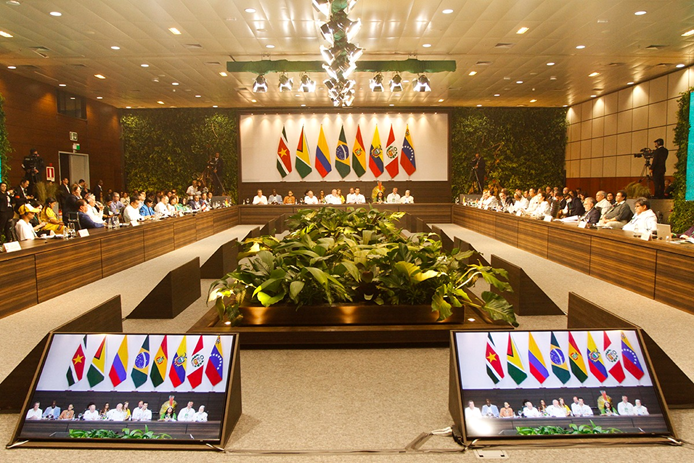South American Nations Convene in Brazil at the Amazon Dialogues

Summit highlights the importance of Indigenous peoples, local communities, global finance, and technical capacity
by Matthew Aruch, PhD
August 14, 2023 — Last week (August 8-10) the eight countries (Bolivia, Brazil, Colombia, Ecuador, Guyana, Peru, Suriname, Venezuela) of the Amazon Conservation Treaty Organization (ACTO) met in Belém, Brazil for the first summit in 14 years to discuss a shared vision for the future of the Amazon forest. On August 9th, ACTO participants were joined by representatives from 4 additional countries (the Democratic Republic of Congo, Indonesia, St. Vincent and Grenadine, and the Republic of Congo). Here are 3 key takeaways from the Summit.
A Shared Vision and a Strong Step Forward for the Amazon and Forest Nations
The nations’ leaders and representatives discussed shared vision and governance of the Amazon region covering a full spectrum of topics. At the culmination of the event, country representatives released the 10,000-word Belem Declaration. The 113-point declaration is a wide reaching, aspirational document toward “a new common agenda in the Amazon, to be implemented under the objective of sustainable development, conservation of forests, sustainable use of biodiversity, forests and water resources, urgent action to avoid the point of no return in the Amazon, the fight against deforestation and illicit activities in the region, economic development with social inclusion…and the strengthening of ACTO.”
While there are concerns about the lack of concrete action or consensus on a number of important issues, The Belem Declaration is an important organizing document and roadmap for Forest-rich Nations to build upon in upcoming meetings including the UN General Assembly, Climate Week, and COP 28.
The Amazon is Much More than Rivers and Forests
The Declaration recognizes that protection of Amazon forests, waterways, and biodiversity begins with the well-being, knowledge, and livelihoods of its inhabitants. Indigenous Peoples, Local Communities, Women, Youth, and other typically sidelined actors feature prominently within the document as essential actors in the deliberation, design, and implementation of all activities. In fact, Indigenous Peoples are mentioned in 41 of the 113 (36%) of the Declaration’s bullet points on issues ranging from territorial rights, infrastructure, resource extraction, knowledge inclusion, and income generation. Indigenous Peoples, Women, and Youth were also noted first point in United for our Forests Communication released by the 12 Forest countries from ACTO (South America), the Congo Basin, and Southeast Asia.
The Important Role of Finance and Technical Support
The Summit also highlighted the important role of wealthy nations, institutions, and individuals to provide financial and technical support. Wealthy countries were called to “meet their commitments to provide and mobilize resources, including the target of mobilizing $100 billion per year in climate finance.” Still, the Summit noted that finances are not enough. Resources need to be provided “with necessary and commensurate scope, scale and speed” alongside the necessary “access to technology and its markets, and capacity building and development… for the sustainable development of the Amazon region.” In short, ACTO leaders called for adequate financing, delivered where needed, when needed, accompanied by appropriate technical capacity and infrastructure for meaningful impact.
ICFC’s Work
ICFC applauds the important discussions of the ACTO Amazon Summit, recognizing that organizations like ours have a role in supporting common goals and interests in support of Indigenous Peoples, Local Communities, and Tropical Forests. ICFC continues to support technical and financial capacity of Amazon forest communities through important projects large and small such as the Rio Jurua project, the Los Amigos Conservation Concession, the Kayapó Project, and the Monitoring of the Andes Amazon Project.
In addition, ICFC remains fully committed to supporting its partners organizations in the Amazon region, but also working with peers to ensure rapid mobilization of financial and technical resources via collaborative networks such as the Protecting our Planet Challenge.
While big questions remain, including those around mining, logging, oil extraction, and transnational crime networks, ICFC will continue to engage with community partners, government representatives, and regional collaborators to ensure just, sustainable Amazon futures.
International Conservation Fund of Canada Copyright © 2009-2025
Registered Canadian charity # 85247 8189 RR0001
